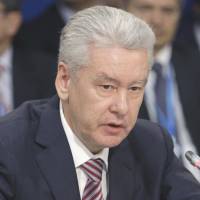The mayor of Moscow said Tuesday he will resign two years early so that elections can be held in September. He intends to run in those elections and is likely to be named acting mayor until then. He is also expected to win.
Pundits described the maneuver as a way for the mayor, who was appointed three years ago, to assume legitimacy through an election — while he is still popular enough to prevail.
They also suggested that it was a calculation made by President Vladimir Putin, a sign to the public that he is willing to allow elections of mayors and governors. At the same time, there appears to be little chance that an opposition candidate could win and govern Russia's most powerful city.
Despite the appearance of Machiavellian tactics, the pundits found reason for cheer. The restoration of mayoral elections means an opportunity for real political life to emerge, or so they hope.
The mayor, Sergei Sobyanin, was appointed in 2010 when the supersized Yuri Luzhkov was sent packing after 18 years for considering himself too powerful. Sobyanin is popular; the commentators say this is mostly because Muscovites see no alternative to him, and they speculate that his appeal could quickly erode if an attractive opposition candidate appears or a sagging economy disenchants voters.
Moving the election to September gives Brooklyn Nets owner Mikhail Prokhorov, who had announced he would run, or anyone else little time to present a serious challenge.
















With your current subscription plan you can comment on stories. However, before writing your first comment, please create a display name in the Profile section of your subscriber account page.